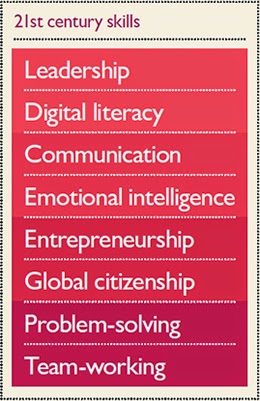Monday, June 23, 2014
Beyond Reading, Writing, and Arithmetic
The Essential Skills for our 21st Century Students
Pearson, along with the Economist Intelligence Unit have worked together to create program that focuses beyond just our three R's. "In recent years it has become increasingly clear that basic reading, writing and arithmetic, while essential, are not necessarily enough. The importance of non-cognitive skills – usually defined as abilities important for social interaction – is also pronounced" (Pearson, n.d.). Students need so much more now-a-days to be able to succeed in the world now. There are many more demands on anyone looking to creating a career for themselves. The Learning Curve which is the name of the program that Pearson is displaying, gives a list of essential skills that our students need to have to be able to survive in the future.
There are eight essential skills:
We, as teachers, have a lot more on our plate than ever before. Our schools districts need to start preparing the teachers, so the teachers can prepare the students and help to instill these skills into our students.
References:
Kharbach, M. (2014, June 23). The 8 Must have Skills for the 21st Century Students. Educational Technology and Mobile Learning. [Web article]. Retrieved from http://www.educatorstechnology.com/2014/06/the-8-must-have-skills-for-21st-century.html
Kielstra, P. (2014). The Learning Curve. Pearson & The Economist Intelligence Unit. Retrieved from
http://thelearningcurve.pearson.com/
Subscribe to:
Post Comments (Atom)

I agree with this post. There is a strong focus on the way students communicate with each other in today's mini lessons. During our lessons we are required to have active engagement when the students are communicating with each other. This was our district focus for professional development this year for teachers. We learned some active engagement pieces to use for student communication.
ReplyDeleteWe have adopted a new math curriculum for the start of next year. The focus is math talk and getting students to talk about math. This is very exciting because students are able to explain how they came to an answer. They are also are taught how to talk to their peers about math.
Communication is a big part of the curriculum today.
I especially like that "emotional intelligence" is on that list. I saw this TED Talk the other day (https://www.youtube.com/watch?v=c0H7b9faIBo) about this 13 year-old-boy who is home schooled. He calls it hijacking his education, and his biggest complaint with public school is that there is no education on happiness, which he studied has 8 components - exercise, diet & nutrition, time in nature, service, relationships, recreation, relaxation & stress management, and religious & spiritual.
ReplyDeleteI think this is neat and there is no argument that we need to be teaching our students all of this because many of them aren't getting it anywhere else. I wonder where we draw the line though, between teaching an parenting? Sometimes I think I ought to just adopt every single one of my students so I can teach them AND parent them.